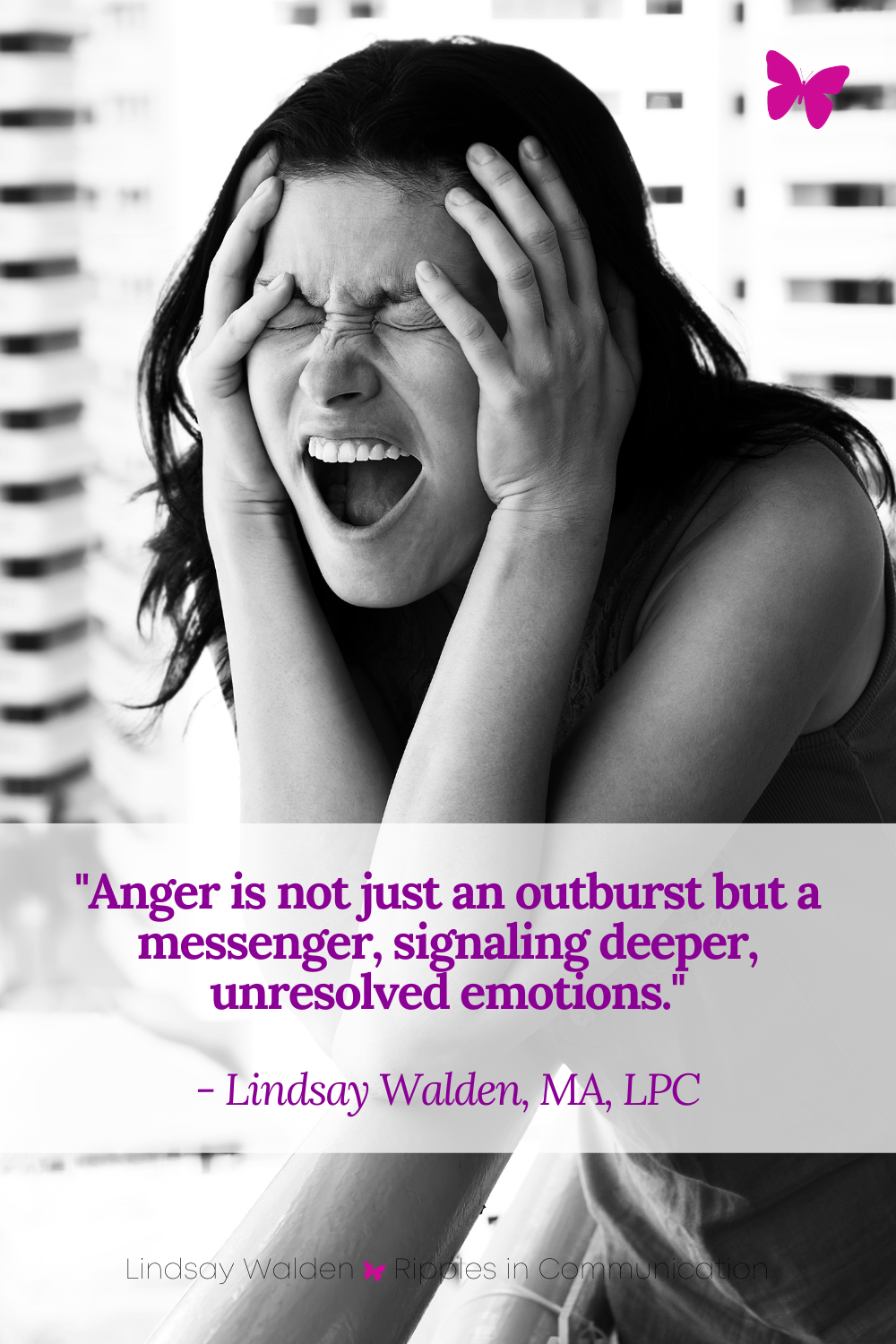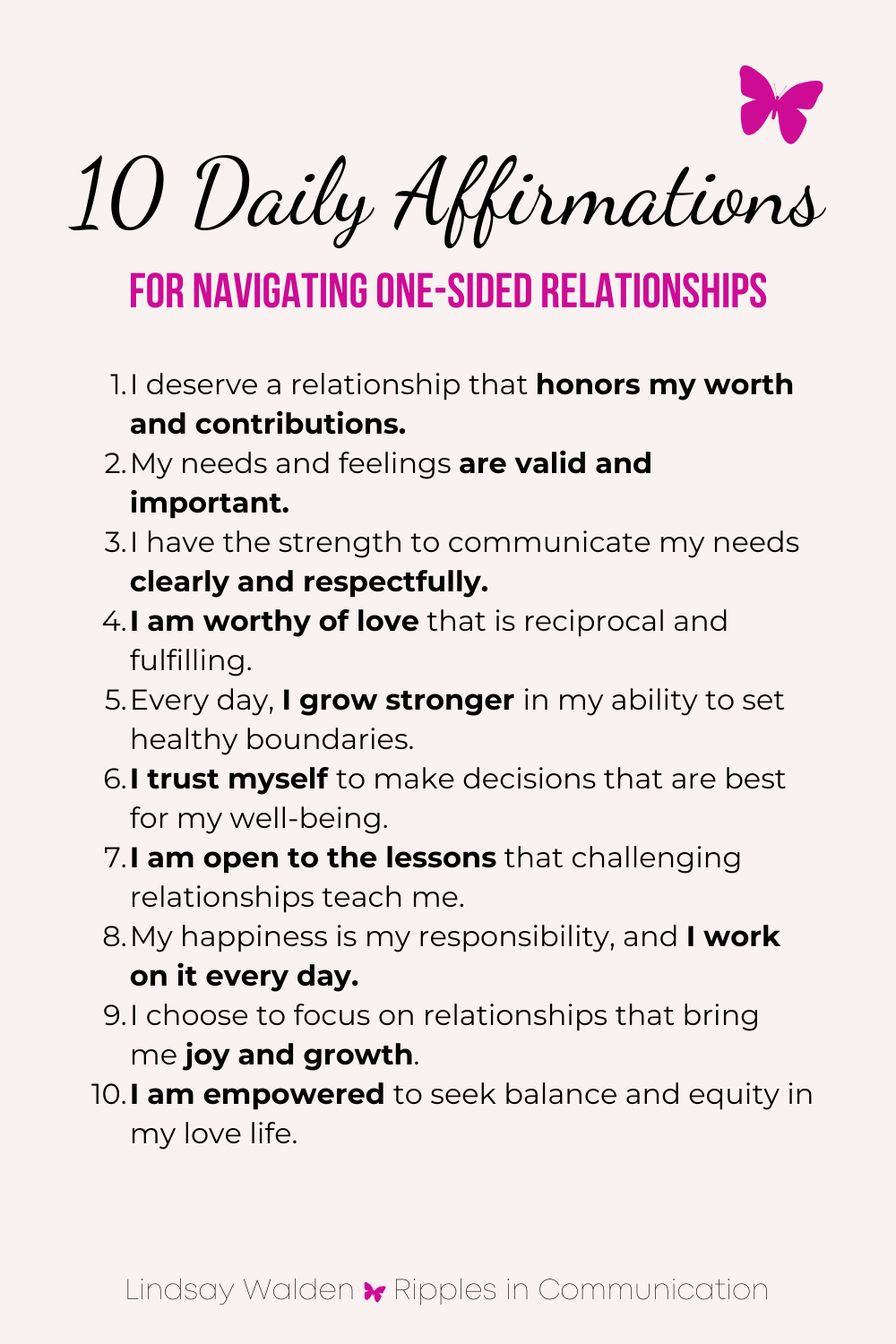Navigating the Storm: When Love Feels One-sided
Understanding One-Sided Relationships
A one-sided relationship often emerges silently, the imbalance growing over time, almost unnoticed. In these dynamics, one partner feels the burden of emotional, and sometimes physical, responsibilities heavily laid upon their shoulders. It leads to feelings of loneliness, resentment, and exhaustion. Addressing this imbalance is critical, not just for the well-being of the individual who feels overwhelmed, but also for the health and longevity of the relationship itself. By confronting these issues, couples can work towards building a stronger, healthier foundation, marked by open communication, mutual respect, and balanced intimacy. Finding the courage to voice concerns and initiate honest conversations can transform a faltering relationship into a thriving partnership.
Key Takeaways:
Understanding: Recognize the signs of a one-sided relationship and acknowledge its impact on both partners and the relationship’s health.
Communication: Embarking on the journey of open and direct conversations can rejuvenate a dwindling connection by addressing underlying issues.
Action: Taking actionable steps towards rebalancing the relationship proves essential in fostering mutual respect, improving intimacy, and building a healthy, empowering partnership.
Have you gotten my FREE Relationship Communication Guide yet? Start building an authentic, conscious, and thriving relationship with your partner TODAY. Say goodbye to misunderstandings, conflicts, and missed opportunities for a deeper connection. These are the same tips and practical advice I give to my clients every day. With this guide, you'll be equipped to navigate any communication challenge and build a strong and fulfilling bond with your partner. Click the button below to enter your email address and I will send the guide to your inbox right away!
10 Signs of a One-Sided Relationship
Recognizing a one-sided relationship can be challenging, especially when feelings and hopes cloud our judgment. However, identifying these signs can be the first step toward addressing the imbalance and working towards a healthier dynamic. Here are key indicators that you might be in a one-sided relationship:
Unequal Effort: You consistently put more effort into the relationship, from planning dates to initiating conversations, while your partner remains passive or indifferent.
Lack of Reciprocity: Your acts of love and kindness are not reciprocated, leaving you feeling unappreciated and taken for granted.
Emotional Support Imbalance: You are always there to support your partner during tough times, but when you need emotional support, your partner is unavailable or dismissive.
Communication is One-Way: You often share your thoughts and feelings, but your partner is reluctant to open up or share their own experiences, leading to a lack of depth in your conversations.
You Justify Their Behavior: You find yourself making excuses for your partner's lack of involvement or interest in the relationship.
Neglecting Your Needs: Your needs and desires are consistently sidelined, and the relationship revolves around your partner’s preferences and convenience.
Feeling Alone in the Relationship: Despite being in a relationship, you often feel lonely and unsupported, craving more connection and intimacy.
Your Friends and Family Notice: People close to you express concern about how one-sided the relationship seems and how it might be affecting you.
Frequent Self-Doubt: You constantly question your worth and whether you’re asking for too much by wanting a more balanced and reciprocal relationship.
Reluctance to Plan for the Future: Your partner avoids discussions about future plans or commitments, making you feel uncertain about where the relationship stands.
Recognizing these signs is a crucial step in acknowledging the reality of your relationship dynamics. While the realization can be painful, it opens the door to necessary conversations and decisions about your future, whether that means working together to rebalance the relationship or considering your own well-being and moving on.
Feeling stuck in a one-sided relationship? Learn effective strategies for dealing with the imbalance and moving towards a healthier connection.
The Role of Anger: A Secondary Emotion
Many misunderstand anger in relationships, often viewing it as the root problem. I want to clarify that anger is not just an outburst but a messenger, signaling deeper, unresolved emotions. We tend to label our discomfort and pain simply as anger, but it's more complex. This emotional response plays the role of a protector, shielding us from facing those more vulnerable feelings underneath, such as hurt, disappointment, or fear. By acknowledging anger as a secondary emotion, we're allowed a moment of introspection, a window into our inner world that might hold keys to healing both personal and relational wounds. Seeing anger as an ally rather than an adversary paves the way for meaningful, open communication, laying a solid foundation for overcoming intimacy problems, communication issues, and the challenges of a one-sided relationship.
Digging Deeper: The Thing Beneath the Thing
Anger, I've observed, isn't just a primary emotion. It cleverly disguises a spectrum of feelings we struggle to confront. This discovery has been pivotal in how I aid couples and individuals in untangling the web of emotions that contribute to intimacy problems and communication issues. Those who label their frustration solely as anger might miss the opportunity for deeper exploration and, subsequently, healing. Within every instance of resentment or fury lies a more vulnerable sentiment—a secondary emotion waiting to be acknowledged.
In my practice, addressing these concealed emotions serves as the first step towards mending the foundation of a relationship. It's not merely about neutralizing conflicts; it's about embarking on a journey of open communication and understanding. By embracing this approach, couples find themselves capable of transforming their one-sided relationship into a balanced, healthy partnership. The process isn't easy, but it's essential for those seeking a renewed connection.
The Dangers of Residue Buildup
In any partnership, unresolved communication issues, intimacy problems, and the impacts of past traumas can begin to accumulate, much like invisible layers of dust on a cherished photograph. This accumulation, or what I refer to as 'relationship residue,' gradually obscures the clarity and strength of our connection. At first, it may seem manageable, a slight annoyance easily brushed aside. Yet, over time, this residue becomes thick, hardened, and much more difficult to remove. It hampers not just the health of the relationship, but also our very ability to see one another clearly.
Addressing this buildup quickly is crucial. It requires open communication, direct conversations, and the courage to face these challenges head-on. Only by acknowledging and working through these issues can we hope to rebuild a healthy relationship foundation, eliminating the residue and restoring the intimacy and understanding that once defined our bond. This process fosters empowerment in relationships, turning what seemed like insurmountable obstacles into stepping stones towards a deeper connection.
Initiating Courageous Conversations
Embarking on the path of courageous conversations requires a delicate balance and precise timing. Finding the ideal moment to talk is crucial. It ensures you both are mentally and emotionally prepared to engage meaningfully. Aim for a time when distractions are minimal, and you're unlikely to be interrupted. This level of open communication, direct conversations, and honesty lays a solid relationship foundation, helping to address communication issues, intimacy problems, and past traumas.
Ensure equality in the dialogue by giving each person a chance to express their thoughts and emotions without fear of judgment or interruption. This practice fosters an environment where both individuals feel heard, validated, and important. Remember, building healthy relationships thrives on the ability to share openly, listen actively, and respond with empathy. By initiating these discussions, you take actionable steps toward neutralizing conflicts and strengthening your bond.
This powerful quote sheds light on anger's true role in relationships. Discover how it can lead us to understand and heal our deepest wounds.
6 Actionable Steps to Neutralize Conflict
Identify the underlying emotions behind your anger. It often masks feelings such as sadness, frustration, or fear in relationships. Acknowledgment paves the way for open communication.
Schedule a time for a courageous conversation. Choose a moment when both of you are less likely to be distracted or stressed. This ensures that both voices are heard equally.
Use "I" statements to express yourself. Rather than blaming your partner, share how you feel. This minimizes defensiveness and promotes a deeper understanding.
Create a neutral space for discussions. Avoid locations charged with past conflicts. Neutral settings help in reducing tension and fostering honest exchanges.
Seek professional help if necessary. Sometimes, guidance from a couples and sex therapist can provide strategies to address communication issues, intimacy problems, and past traumas effectively.
Implement a regular check-in routine. Regularly touching base on your relationship’s health can prevent the buildup of resentment and ensure issues are addressed promptly.
The Power of Empowerment
Feeling empowered shifts your stance in a relationship fundamentally. It transforms you from a passive participant to an active stakeholder. This is crucial in addressing one-sided relationship dynamics. Empowerment breeds a profound sense of responsibility and agency. It allows individuals to recognize their capability to influence change. In a partnership where one has felt sidelined, understanding their power can illuminate paths previously unseen. This realization is empowering. It urges one to initiate honest conversations and tackle communication issues head-on. The journey from feeling overburdened to achieving an equitable relationship foundation involves courage and direct conversations.
By embracing empowerment, you awaken to the significance of expressing emotions and neutralizing conflicts constructively. Actionable steps toward open communication become clearer, guiding you out of the shadow of past traumas. It paves the way for building healthy relationships filled with mutual support and intimacy. Ultimately, empowerment in relationships does not merely point towards a better way; it leads us directly to it, fostering a robust, thriving connection that withstands the test of time.
When to Seek Professional Help
Embarking on the path to mend a one-sided relationship often requires more than determination; it necessitates external support and guidance. Recognizing the critical juncture at which professional assistance becomes essential marks a pivotal moment in this journey. Signs that underline the urgency include persistent communication issues, unresolved anger in relationships, and the encumbrance of past traumas stifling intimacy levels. These manifestations do not merely point toward temporary setbacks but indicate deeper rifts requiring expert intervention.
In such scenarios, couples and sex therapists equip you with effective strategies, aiming to dismantle the barriers hindering open and direct conversations. Facilitating courageous conversations becomes feasible, as therapists guide you through navigating relationship residue and neutralizing conflicts. The expertise of these professionals extends beyond addressing surface-level symptoms; they delve into the core of relationship healing. Therapy provides a safe space for expressing emotions freely, enabling both partners to explore and address underlying issues. This process is not about assigning blame but about fostering understanding and empathy, thereby laying down a strong, healthy foundation for a rejuvenated partnership.
Navigating Together: Steps Towards Rebalancing
Entering into the process of rebalancing a one-sided relationship demands courage, open communication, and a shared commitment to growth. It begins with acknowledging the imbalance and deciding, together, to make a change. Here are your actionable steps:
Initiate Courageous Conversations: Set aside a quiet, uninterrupted time to discuss your feelings and concerns. Expressing emotions transparently will start paving the way towards understanding and empathy.
Acknowledge and Validate Feelings: Both partners must feel heard and understood. Recognize the validity of each other's emotions without jumping to defense or resolution immediately.
Identify Specific Issues: Work on pinpointing exact areas within your relationship where the imbalance lies, may it be in chores, emotional support, or decision-making.
Establish Actionable Goals: Collaboratively create practical, achievable goals to address these issues. These could range from scheduling regular date nights to enhance intimacy to dividing household responsibilities more equitably.
Embrace Vulnerability: Being open to discussing past traumas or insecurities can significantly improve intimacy and understanding between partners.
Maintain Regular Check-ins: Consistent communication is key. Schedule periodic meetings to review the progress on your goals and adjust them as needed.
Seek Professional Help if Necessary: Sometimes, external guidance from a couples and sex therapist can offer fresh perspectives and strategies, empowering you to navigate through communication issues more effectively. I want you to know I am here to help you. It's been my passion for almost two decades now to help couples get to the root of what's causing them so much pain in their relationship and help them to build a strong foundation of love, support, and open communication so all can thrive. Please reach out.
Rebuilding the foundation of your relationship with these steps can transform anger and frustration into a renewed partnership marked by balanced responsibilities, deeper intimacy, and healthier, direct conversations.
The Courage to Be Vulnerable
In any thriving and intimate relationship, embracing vulnerability is paramount. It acts as the key that unlocks the door to a deeper connection and fosters healing, especially when navigating the choppy waters of a one-sided relationship. I've seen time and again how opening up and showing our true selves can bridge gaps caused by communication issues, intimacy problems, and even past traumas.
Often, we shroud our feelings in anger, not realizing it's a secondary emotion hiding the real issues beneath. Courageous conversations, grounded in vulnerability, allow us to express these hidden emotions, facilitating relationship healing. By laying bare our fears, desires, and disappointments, we invite our partners into our inner world, making it possible to work on building a healthy relationship foundation together.
To truly improve intimacy and neutralize conflicts within a one-sided relationship, we must first have honest, direct conversations about our emotional states. This process may feel daunting, requiring us to dig deep and address the relationship residue that has accumulated over time. Yet, it's through this profound vulnerability that we find empowerment in relationships, leading to a renewed partnership marked by open communication and mutual understanding.
Beyond the Horizon: A Renewed Partnership
Embarking on the journey to mend a one-sided relationship can feel daunting. It may seem like sailing into uncharted waters without a map. Yet, influenced by our shared experiences, courage, and sincere desire for improvement, we harness the power to steer towards a destination filled with mutual respect, understanding, and profound intimacy. The process demands dedication and open communication; it is not for the faint of heart. However, the rewards of navigating this storm together can lead to a renewed partnership that was once deemed unattainable.
The transformation begins with the brave step of addressing the anger and communication issues that have shadowed our interactions. Understanding that anger is often a secondary emotion unveils the intricate web of feelings beneath. This revelation requires us to confront past traumas and intimacy problems that have hindered our growth. Through direct conversations, we start peeling away the layers of resentment and misunderstanding, gradually uncovering the essence of our love.
In this endeavor, it is crucial that both partners feel empowered to voice their needs and concerns. By fostering an environment where honest conversations are not only encouraged but valued, we lay down the stones for a solid relationship foundation. Each step forward may present its challenges, but with actionable guidance and a commitment to building healthy relationships, we find ourselves inching closer to equilibrium. As a result, we witness the dissolution of the relationship residue that once seemed an insurmountable obstacle.
Engaging in courageous conversations, expressing emotions freely, and demonstrating a willingness to neutralize conflicts, collectively, mark the beginning of healing. As we embark on this path of relationship renewal, our collective efforts will illuminate the way towards a partnership characterized by genuine connection and fortified intimacy. A horizon where every storm faced strengthens the bond, and the love once deemed one-sided blossoms into a thriving, reciprocal relationship.
Empower your journey through one-sided relationships with these 10 daily affirmations. Embrace your worth, communicate your needs, and find the balance you deserve in love.







